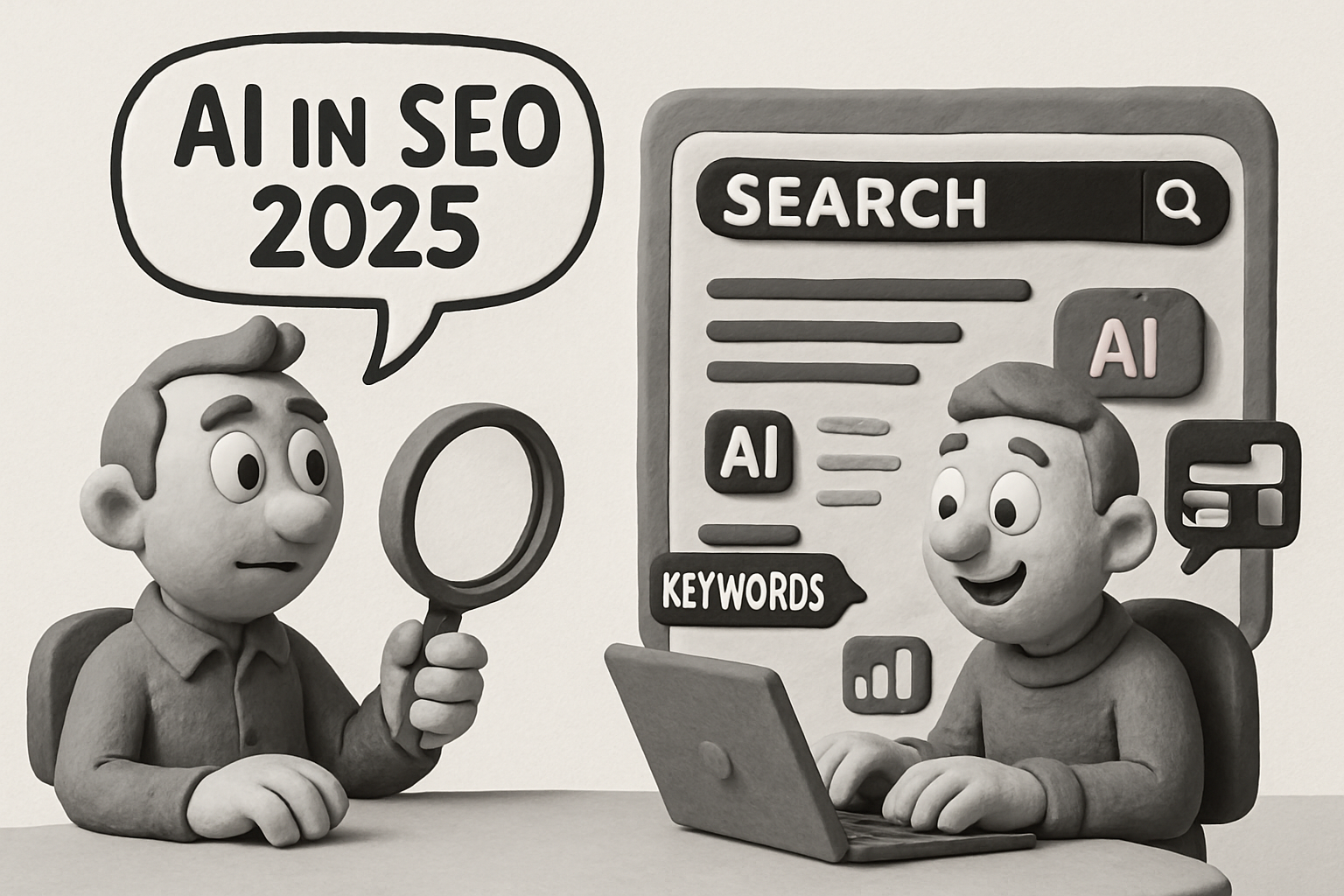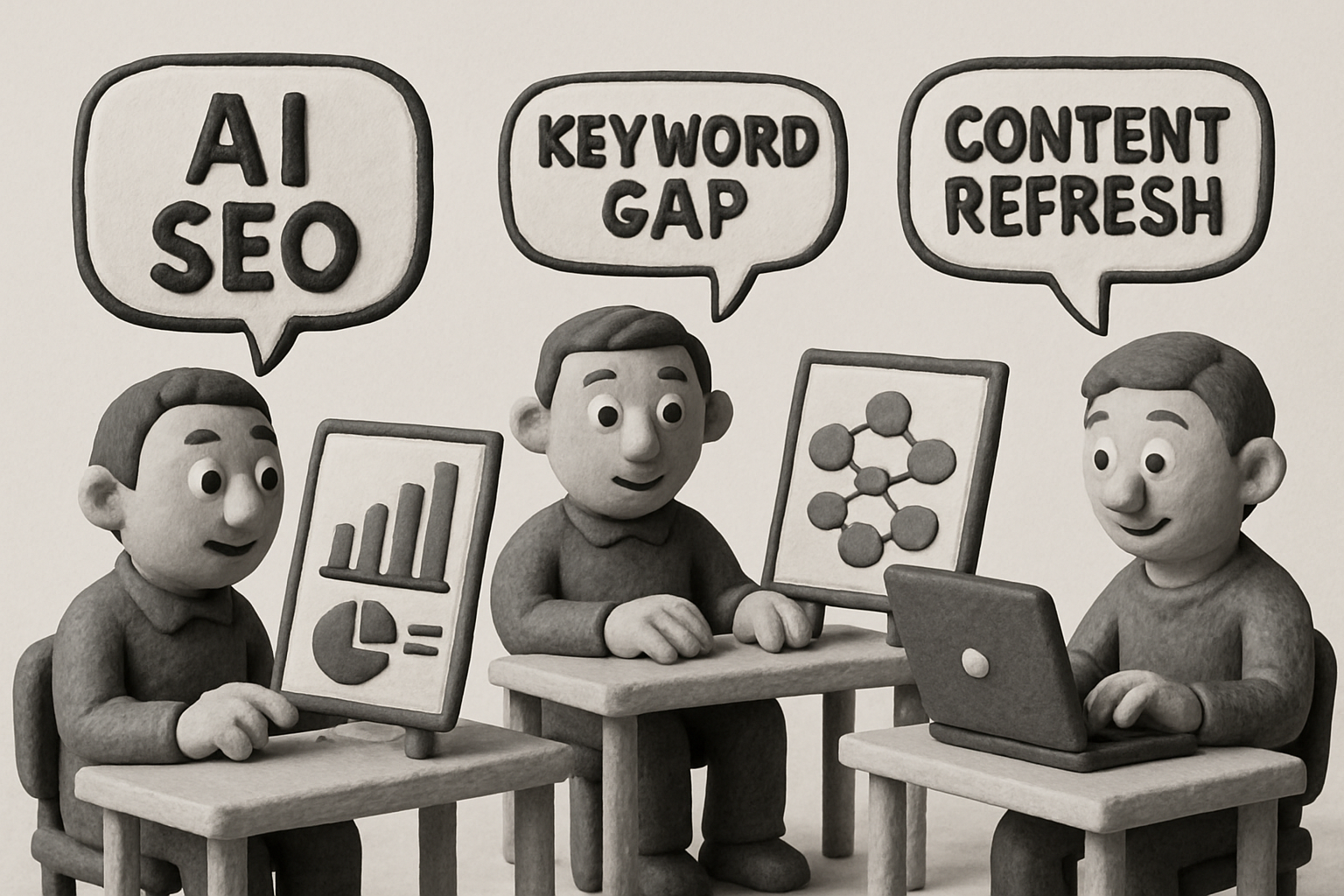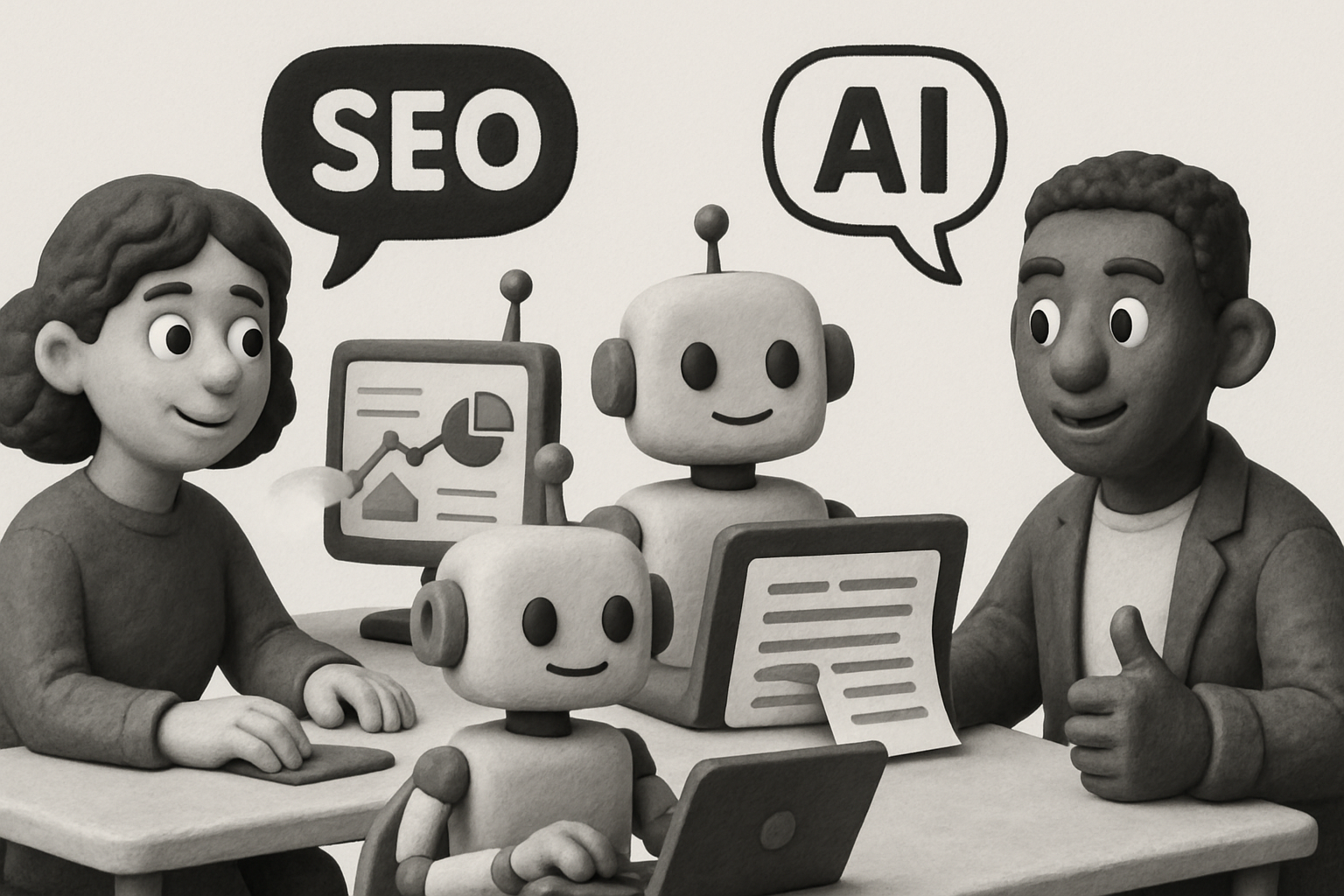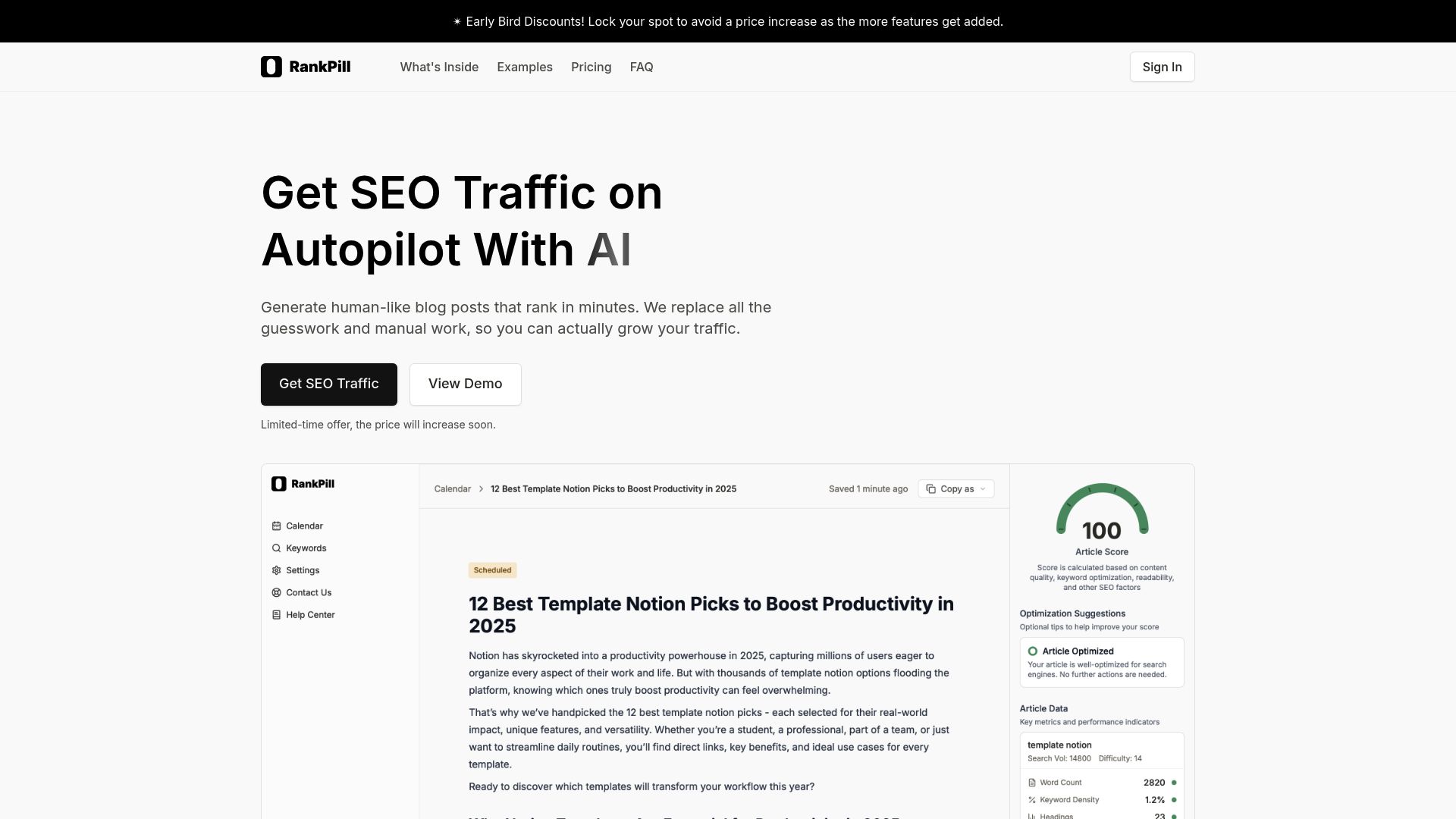AI is shaking up the SEO landscape in 2025, driving a dramatic shift toward smarter, AI-powered search engines and changing how businesses compete online.
This handbook explores how ai seo is completely redefining strategies, tools, and workflows for digital marketers. You’ll discover actionable trends and best practices designed to future-proof your organic growth.
We’ll guide you through the latest in keyword research, content creation, automation, data integrity, and emerging technologies—everything you need to stay ahead.
Ready to boost productivity, climb the rankings, and gain a competitive edge? It’s time to embrace the new era and make AI-driven SEO your next strategic move.
The Evolution of AI in SEO: 2025 Landscape
Artificial intelligence has fundamentally changed the way we approach search engine optimization. As we move through 2025, the ai seo landscape is rapidly evolving, with new tools and smarter algorithms reshaping how websites are discovered, ranked, and engaged with online.

AI’s Growing Influence on Search Engines
The rise of ai seo has transformed how search engines operate. Google’s Search Generative Experience (SGE), SearchGPT, and Perplexity are now driven by powerful AI models that interpret not just keywords, but the intent and context behind every query. This shift means that search engines now prioritize user intent, relevance, and unique context—such as device type and location—over traditional index-based ranking.
Personalization is at an all-time high. AI models can tailor search results to individual users, offering recommendations that reflect past behaviors and real-time needs. For example, AI Overviews now highlight relevant snippets and cite sources directly on the results page, changing the way visibility is measured.
Recent statistics show that 58% of SEO professionals plan to integrate AI into their workflows, with McKinsey projecting $460 billion in productivity gains from AI-driven technologies. As these innovations accelerate, marketers need adaptable ai seo strategies to keep pace with evolving algorithms and user expectations. For a deeper dive into how AI is reshaping ranking factors and methodologies, see this AI in SEO ranking resource.
Key Milestones in AI SEO Technology
From 2020 to 2025, the ai seo landscape has seen remarkable advancements. The launch of tools like Copilot, Autopilot, and DataMind marked a new era in automation, allowing marketers to analyze topics, audit sites, and optimize content faster than ever before.
Generative AI now plays a central role in content creation and topic modeling. These systems can analyze massive datasets, detect trending topics, and recommend keyword clusters that align with user intent. This means SEO teams can identify content gaps and opportunities with unprecedented speed and accuracy.
Automation has also streamlined routine processes. Site audits, performance reporting, and optimization tasks are now handled by AI-powered platforms, freeing up human experts to focus on strategy. The table below highlights some of the key milestones in ai seo technology:
| Year | Milestone | Impact |
|---|---|---|
| 2020 | Generative AI adoption | Smarter topic discovery |
| 2022 | Copilot launch | Automated content drafting |
| 2023 | Autopilot for optimization | Continuous site improvement |
| 2025 | DataMind integration | Advanced keyword analytics |
These breakthroughs underscore the increasing reliance on ai seo for competitive digital marketing.
Why Traditional SEO Alone No Longer Suffices
Manual keyword research and static optimization tactics simply can’t keep up with the complexity of today’s search environment. Search engines update their algorithms at a rapid pace, and user intent has become more dynamic and nuanced than ever.
Ai seo is now essential for responding to these changes. AI systems can refresh outdated content, adapt to new SERP features, and outperform manual methods in both speed and accuracy. For example, AI tools can instantly detect shifts in user behavior or search trends, updating content and strategy in real time.
To stay ahead, businesses must move beyond traditional SEO and fully embrace ai seo as the backbone of their digital strategy. This transformation not only improves performance but also ensures long-term visibility in an ever-evolving search landscape.
Core AI Applications in Modern SEO Workflows
AI SEO is transforming how digital marketers approach every stage of their workflow. From uncovering untapped keywords to automating content updates, AI-powered tools are now at the heart of effective SEO strategies.
These intelligent systems don’t just save time—they also deliver insights and optimizations that would be impossible to achieve manually. Below, we’ll explore the core applications of AI SEO and how they’re reshaping modern workflows.

AI-Powered Keyword Research and Topic Analysis
AI SEO tools have revolutionized how marketers discover new topics and keyword opportunities. Unlike traditional manual research, these platforms analyze massive datasets to spot trends, identify gaps, and cluster keywords by search intent.
For example, AI can distinguish between universal keywords that fit your entire site and page-specific terms that drive niche traffic. This level of nuance is critical for targeting the right audience at the right time.
Platforms like Insights and DataCube leverage machine learning to map out content opportunities and highlight where your competitors are gaining ground. In fact, 40% of SEOs now use AI to update content and refine keyword strategies.
If you’re looking to dive deeper into the latest tools, check out this comprehensive AI SEO tool guide for a breakdown of top solutions and their capabilities.
Automated Content Creation and Optimization
Generative AI is now at the core of content creation for AI SEO workflows. These systems can draft entire blog posts, landing pages, and even suggest titles and meta descriptions—all while aligning with current SEO guidelines.
AI doesn’t just write; it recommends on-page elements, helps maintain consistency, and ensures every piece of content meets E-E-A-T standards (Experience, Expertise, Authoritativeness, Trustworthiness).
For instance, tools like Copilot generate first-draft content that’s already optimized for search. This enables teams to scale production, save hours of manual work, and focus on refining brand voice and accuracy.
The result? Content that’s not only relevant and timely but also structured to perform well in an ever-evolving search landscape.
Refreshing and Leveraging Existing Content
Keeping your website up-to-date is a never-ending process, but AI SEO makes it far more manageable. AI can scan your content library, identify outdated sections, and suggest targeted updates to boost rankings.
Automation extends to optimizing tags, meta information, and aligning your pages with the latest search behavior. Autopilot solutions can even continuously optimize content after publication, ensuring your site adapts as search algorithms change.
This approach reduces manual overhead and guarantees consistency across large content portfolios. The ability to refresh content at scale is now a competitive necessity, not just a nice-to-have.
Embracing Automation for Efficiency
Efficiency is one of the biggest advantages of AI SEO. By automating technical audits, reporting, and other repetitive tasks, teams can focus on strategy and creative work.
AI-driven systems monitor algorithm changes, update internal linking, and recalibrate content clusters in real time. According to recent surveys, productivity gains are the top reason SEOs invest in automation.
The benefits are clear: fewer errors, faster response to shifting search trends, and more time to develop winning strategies. Whether you’re a solo marketer or part of a large enterprise, embracing automation is key to long-term SEO success.
How AI Is Transforming SEO Teams and Roles
The rise of ai seo is redefining the DNA of digital marketing teams. In 2025, organizations must adapt not just their strategies, but also their workflows and team structures. As AI-powered tools become foundational to SEO, roles evolve, new skills emerge, and collaboration between humans and machines takes center stage.

Redefining Content Creation and Editorial Processes
AI SEO has unlocked unprecedented content scalability for teams. Instead of manually brainstorming, drafting, and editing every piece, marketers now use AI to generate outlines, suggest trending topics, and even produce first drafts. Editors shift from line-by-line correction to strategic oversight—reviewing AI-generated content for tone, accuracy, and alignment with brand guidelines.
Benefits of AI in content creation:
- Accelerated production of high-quality, search-optimized articles.
- Real-time analysis of trending topics and user intent.
- Consistent application of E-E-A-T principles across all content.
Teams increasingly leverage AI to sync content with fast-changing search behaviors. By integrating AI SEO tools, they ensure every article matches what audiences are actively searching for—improving both relevance and organic reach.
The Expanding Role of SEO Managers
SEO managers are undergoing a major transformation. The focus is shifting from hands-on optimization to data-driven strategy and cross-channel leadership. With AI SEO automating keyword research, technical audits, and content recommendations, managers spend less time on repetitive tasks and more on interpreting insights and shaping big-picture plans.
A recent AI's Impact on SEO Strategies analysis highlights how nearly 90% of organizations now plan to prioritize SEO, underscoring the demand for leaders skilled in both AI and organic growth. Modern SEO managers must harness AI SEO for competitive advantage—using automation to scale efforts and drive measurable results across platforms.
Changing responsibilities include:
- Overseeing AI-driven content pipelines.
- Collaborating with data analysts and content strategists.
- Monitoring AI SEO performance metrics and adjusting strategy in real time.
Data Integrity and Compliance in AI SEO
As AI SEO becomes more embedded in daily operations, data integrity and privacy are critical. Relying on proprietary keyword datasets—rather than user-specific data—helps teams maintain compliance with evolving regulations. Tools like DataMind and DataCube are at the forefront, focusing on keyword-driven models that avoid privacy pitfalls.
Key compliance practices:
- Regular audits of AI SEO tools for data handling.
- Limiting data sources to anonymized or proprietary sets.
- Staying current with international privacy standards.
Teams must balance AI SEO’s power with responsibility, ensuring every automated insight or content update respects user privacy and regulatory demands.
Efficiency and Scale: Doing More With Less
Generative AI SEO is a game-changer for efficiency. Routine tasks—such as technical audits, reporting, and initial drafting—are now automated, freeing teams to focus on strategy and innovation. This shift benefits both lean startups and large enterprises, allowing them to meet the demands of Google’s rapid algorithm changes and increasing content expectations.
Efficiency gains with AI SEO:
- Faster turnaround for content updates and optimizations.
- Reduced human error in repetitive workflows.
- More time for creative, high-impact projects.
By embracing AI SEO, teams can achieve more with fewer resources, driving growth and maintaining a competitive edge in the ever-evolving digital landscape.
Implementing an AI-Driven SEO Strategy: Step-by-Step Guide
Adopting an ai seo approach is no longer optional—it's essential for staying ahead in 2025. With the right strategy, you can transform your SEO workflow, boost productivity, and future-proof your organic growth. Here’s a practical, step-by-step guide to implementing ai seo in your organization.
Step 1: Assess Your Current SEO Workflow
Start by auditing your existing SEO processes. Evaluate how you currently handle keyword research, content creation, technical audits, and reporting. Identify manual bottlenecks—are there repetitive tasks slowing you down?
Create a list of areas where ai seo could add value. Common candidates include:
- Manual keyword research
- Routine content updates
- Technical site audits
- Monthly reporting
Document your current tools and workflows. This baseline assessment helps you pinpoint where automation can deliver the biggest impact.
Step 2: Select the Right AI SEO Tools
Choosing the right ai seo tools is critical. Look for platforms that align with your business needs, integrate well with your CMS, and support automation. Consider the following factors:
- Integration capabilities
- Data source reliability
- Automation features
- Scalability for your team size
Here's a quick comparison of leading tools:
| Tool | Automation | Content Generation | Reporting | Scalability |
|---|---|---|---|---|
| Copilot | Yes | Yes | Good | High |
| Autopilot | Excellent | Yes | Strong | Medium |
| DataMind | Good | Limited | Advanced | High |
Evaluate each option for compliance with data privacy standards. Test a shortlist of tools before rolling out ai seo across your team.
Step 3: Integrate AI Into Content Creation
With tools in place, develop clear guidelines for ai seo content creation. Define your brand voice, tone, and quality standards. AI can generate first-draft blog posts, landing pages, and even meta descriptions, but human review remains crucial.
Build a workflow:
- Use AI to draft content based on keyword research.
- Have editors refine the copy for E-E-A-T and brand consistency.
- Check for factual accuracy and natural flow.
This hybrid approach lets you scale content production while maintaining quality and trustworthiness.
Step 4: Automate Monitoring and Optimization
Automation is the backbone of modern ai seo strategies. Set up AI-driven site audits and real-time performance tracking. Automate updates for meta tags, internal linking, and content refreshes.
For example, you can use platforms like Autopilot to continuously recalibrate your SEO clusters as search behavior shifts. For more details, check this guide on Autopilot SEO automation.
Benefits include:
- Faster response to algorithm changes
- Consistent optimization across your site
- Reduced manual workload
Step 5: Ensure Data Integrity and Privacy
As you implement ai seo, prioritize data integrity. Use proprietary keyword datasets rather than sensitive user data. Regularly audit your AI tools to ensure compliance with privacy standards and industry regulations.
Best practices:
- Store keyword data securely
- Limit access to sensitive information
- Choose tools with transparent data policies
This approach protects your users while enabling robust AI-powered insights.
Step 6: Measure, Analyze, and Iterate
Finally, establish clear KPIs for your ai seo performance. Monitor organic traffic, keyword rankings, and user engagement. Use AI-powered analytics to gain actionable insights.
Set a regular cadence for reviewing results:
- Weekly or monthly performance reviews
- Iterative updates based on AI recommendations
- Continuous learning and process improvement
By measuring and refining your ai seo strategy, you'll maximize ROI and stay ahead of the competition.
The Future of AI SEO: Trends and Predictions for 2025 and Beyond
The future of ai seo is unfolding faster than anyone expected. As we look to 2025 and beyond, marketers and businesses are facing a landscape shaped by constant innovation and disruption. AI is no longer just a tool—it’s the driving force behind how search engines operate, how users find information, and how brands compete for attention. Let’s break down the trends and predictions set to define ai seo in the coming years.
Generative AI and Search Experience Evolution
Generative AI is transforming how search engines display information. Instead of simple blue links, users are now met with rich AI-generated overviews, instant answers, and interactive elements. This shift is leading to more zero-click searches, where users get what they need without leaving the SERP. As a result, organic traffic patterns are changing, and traditional ranking signals are evolving. To stay visible, brands must optimize for these new AI-driven results. For practical tips, check out Optimizing Content for AI-Powered SERPs, which explores strategies for adapting to this evolving ai seo landscape.
Personalization and Hyper-Contextual Search
AI is enabling search engines to deliver deeply personalized results. Factors like user intent, device type, and even location are now core to ranking decisions. For ai seo, this means local SEO, mobile optimization, and voice search are more important than ever. Businesses must tailor their content and technical strategies to meet users where they are, providing experiences that feel relevant and timely. Hyper-contextual targeting will be key to standing out as personalization becomes the norm.
AI-Driven Content Quality and E-E-A-T
Quality content is king, but in 2025, search engines are raising the bar even higher. AI is being used to evaluate content for Experience, Expertise, Authoritativeness, and Trustworthiness (E-E-A-T). To succeed with ai seo, content must not only be informative but also human-like and credible. Incorporating best practices for Humanizing AI-generated content can help ensure your pages meet these rising standards. AI will play a growing role in verifying sources, detecting bias, and promoting trustworthy information.
Automation and Human-AI Collaboration
The relationship between automation and human creativity is entering a new era. AI can now handle routine SEO tasks—like site audits, reporting, and even first-draft content—at unprecedented scale. However, the best ai seo results come from teams that blend automation with strategic oversight and creative thinking. Editorial teams are shifting from manual review to AI-assisted processes, allowing more time for innovation and big-picture planning. This synergy will define the next generation of SEO workflows.
Preparing for Algorithm Shifts and Regulatory Changes
As AI technology advances, search algorithms will keep evolving—and regulations will get stricter. Agility is essential for ai seo success. Teams should invest in ongoing education, regularly update their tools, and pay close attention to privacy standards. Future regulations may impact how data is collected and used, making compliance a non-negotiable. Staying flexible and informed will help businesses navigate both technical and legal changes in the AI-powered search landscape.
Essential AI SEO Tools and Platforms for 2025
Staying ahead in the rapidly evolving world of ai seo means choosing the right tools to automate, analyze, and optimize your strategy. In 2025, digital marketers have access to a powerful suite of platforms designed to streamline every aspect of SEO—from keyword research to content automation and reporting. Let’s dive into the essential platforms, their standout features, and how you can integrate them for maximum impact.
Overview of Leading AI SEO Platforms
The ai seo landscape is filled with innovative platforms, each offering unique strengths. Here’s a quick comparison of the top contenders:
| Platform | Key Features | Best For | Pros | Cons |
|---|---|---|---|---|
| Copilot | Content generation, audit | Mid-large businesses | Fast drafts, robust analytics | Learning curve |
| Autopilot | Continuous optimization | Agencies, enterprises | Set-and-forget workflows | Less creative flexibility |
| DataMind | Keyword intelligence | Data-driven teams | Deep analysis, custom datasets | Premium pricing |
| DataCube | Reporting, clustering | SMBs, marketing teams | Easy reporting, topic clusters | Fewer integrations |
According to recent AI SEO Tools Market Growth Statistics, adoption of ai seo tools has surged as marketers prioritize automation, personalization, and efficiency. With platforms rapidly innovating, flexibility and scalability are now must-haves for effective organic growth.
RankPill: AI-Powered SEO Content Automation
RankPill stands out as a comprehensive ai seo solution that empowers businesses to scale content effortlessly. The platform automates blog post creation, competitor keyword research, and content scheduling—all through a user-friendly dashboard.

What makes RankPill unique? It delivers human-like content, seamlessly integrates images and videos, and offers personalized keyword targeting for every campaign. The built-in content calendar streamlines planning, while automated workflows ensure consistent output.
Consider a business struggling to keep pace with content demands. By adopting RankPill, they can rapidly increase organic traffic, reduce manual workload, and maintain a steady publishing cadence. For anyone seeking scalable, cost-effective ai seo, RankPill is a game changer.
Integrations and Workflow Automation
Seamless integration is essential for modern ai seo platforms. Connecting your SEO tools with your CMS, analytics, and marketing systems enables real-time data sharing and workflow automation.
Popular integrations include:
- WordPress, Shopify, and other CMS platforms
- Google Analytics and Data Studio for unified reporting
- Slack or email notifications for instant updates
Automated publishing, keyword tracking, and performance alerts become possible when your tech stack is interconnected. This level of automation not only saves time but also ensures your ai seo efforts remain agile and responsive as search trends shift.
Choosing the Right Tools for Your Business
Selecting the best ai seo platform requires careful evaluation. Here’s a quick checklist to guide your decision:
- Ease of use: Is the interface intuitive for your team?
- Integration: Can it connect with your existing tools?
- Automation: What tasks can it automate end-to-end?
- Support: Is training and customer assistance available?
- Scalability: Will it grow alongside your business?
- Compliance: Does it meet data privacy standards?
Pilot new platforms with a small project before full-scale rollout. Gather feedback from your team and monitor early results to ensure the ai seo tool aligns with your workflow and goals.
Maximizing ROI with AI SEO Technology
To truly benefit from ai seo, focus on leveraging automation for high-impact gains. Automate repetitive tasks like meta tag updates, internal linking, and content refreshes to free up time for strategy and creativity.
Measure impact by tracking KPIs such as organic traffic, keyword rankings, and engagement rates. Use built-in analytics to identify what’s working and where to optimize further. As reported in recent AI SEO Tools Market Growth Statistics, businesses embracing ai seo automation consistently outperform competitors in both efficiency and cost savings.
Continually refine your approach by staying updated on platform enhancements and emerging trends. This ensures your ai seo investments deliver sustainable, long-term growth.
If you’re ready to turn the insights from this AI SEO guide into real growth for your business, now’s the perfect time to take action. We’ve seen how automation, smarter keyword targeting, and content optimization can truly transform your SEO strategy—and with platforms like RankPill, you don’t have to do it alone. Imagine having your blog posts, competitor analysis, and publishing schedule all handled by AI, so you can focus on scaling what matters most. Curious to see how effortless SEO can be in 2025? Get Started and watch your organic traffic soar.